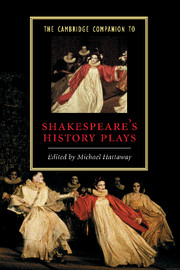Book contents
- Frontmatter
- PART 1 CONTEXTS
- PART 2 THE PLAYS
- 6 Plantagenets, Lancastrians, Yorkists, and Tudors: 1–3 Henry VI, Richard III, Edward III
- 7 Historical legacy and fiction: The poetical reinvention of King Richard III
- 8 King John: changing perspectives
- 9 Richard II: Shakespeare and the languages of the stage
- 10 Henry IV, Parts 1 and 2
- 11 Henry V: ‘the quick forge and working house of thought’
- 12 Shakespeare's ancient Rome: difference and identity
- 13 Shakespeare's other historical plays
- 14 Theatrical afterlives
- PART 3 REFERENCE MATERIAL
7 - Historical legacy and fiction: The poetical reinvention of King Richard III
from PART 2 - THE PLAYS
Published online by Cambridge University Press: 28 May 2006
- Frontmatter
- PART 1 CONTEXTS
- PART 2 THE PLAYS
- 6 Plantagenets, Lancastrians, Yorkists, and Tudors: 1–3 Henry VI, Richard III, Edward III
- 7 Historical legacy and fiction: The poetical reinvention of King Richard III
- 8 King John: changing perspectives
- 9 Richard II: Shakespeare and the languages of the stage
- 10 Henry IV, Parts 1 and 2
- 11 Henry V: ‘the quick forge and working house of thought’
- 12 Shakespeare's ancient Rome: difference and identity
- 13 Shakespeare's other historical plays
- 14 Theatrical afterlives
- PART 3 REFERENCE MATERIAL
Summary
In performance, Richard of Gloucester emerges as the complete figure of the 'chameleon' prince previously featured in 3 Henry VI (3.2.191). This essay will argue that Shakespeare poetically reworked his sources to develop further the figure of Richard III as a degenerate monster. Richard's self-proclaimed deformity, a sign both of unnaturalness and enormity, is established at the very beginning of the play when Shakespeare's brilliant strategic placing of Richard's body and large histrionic presence emerges from its famous opening speech:
I that am rudely stamped and want love’s majesty
To strut before a wanton ambling nymph,
I that am curtailed of this fair proportion,
Cheated of feature by dissembling nature,
Deformed, unfinished, sent before my time
Into this breathing world scarce half made up,
And that so lamely and unfashionable
That dogs bark at me as I halt by them,
Why, I, in this weak piping time of peace,
>Have no delight to pass away the time,
Unless to spy my shadow in the sun
And descant on mine own deformity.
(1.1.16–27)
- Type
- Chapter
- Information
- The Cambridge Companion to Shakespeare's History Plays , pp. 106 - 125Publisher: Cambridge University PressPrint publication year: 2002
- 4
- Cited by

